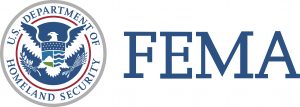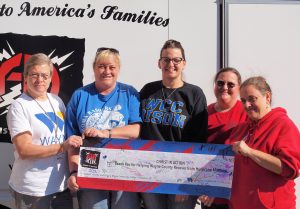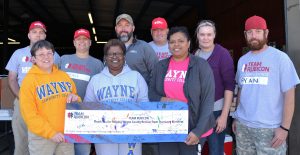The North Carolina Department of Health and Human Services shared the following documents about mold that may be occurring as a result of Hurricane Matthew.
Mold Moisture Health Effects
Mold Cleaning and Prevention
Get Rid of Mold
For more information about mold and keeping your home safe, check out EPA’s website: www.epa.gov/mold/mold-cleanup-your-home.

Thousands of North Carolinians registered for disaster assistance since Hurricane Matthew struck the state Oct. 4, and thousands more may still be eligible.
Some survivors don’t register for assistance for a variety reasons, including misunderstandings, rumors and misconceptions and therefore miss out on financial and other disaster assistance.
If you haven’t yet registered and are a homeowner, renter or business owner with disaster-related damage in a designated county, do not let misinformation keep you from registering. Do it now before it’s too late.
FEMA and the State works closely with other state and federal partners, the private sector, faith-based and voluntary agencies to help match survivors with avenues of assistance. No one is denied disaster assistance because of someone else’s need and most programs are not dependent on income.
Two common misconceptions regarding registering with FEMA are:
If you haven’t registered because English is not your first language, don’t let that stop you. If you or someone you know needs language assistance, FEMA has interpreters who speak many languages. Translators are available and can help you in the registration process.
Also know that you may apply if you are a non-citizen national with a Social Security number or a qualified alien who holds permanent residency, refugee, or asylum status. If you are the parent of a U.S. citizen in your household, you may apply for federal disaster assistance on behalf of your child.
If you are a renter and haven’t registered, know that you too may be eligible for federal disaster assistance and referrals to state agencies that may be able to help.
As an applicant, your information is confidential. FEMA does not share your information with other agencies unless you want us to do so.
FEMA, NCEM and the U.S. Small Business Administration offer a variety of programs to help in your recovery. FEMA assistance will not affect your government benefits, such as Social Security, Medicare, Medicaid or SNAP (Supplemental Nutrition Assistance Program) and you will not pay additional income taxes or see any reduction in your Social Security checks or any other federal benefits.
The following are commonly asked questions and responses with accurate information about federal and state disaster programs and services:
For more information on the North Carolina recovery, visit fema.gov/disaster/4285 and readync.org. Follow FEMA on Twitter @femaregion4 and North Carolina Emergency Management @ncemergency. You also can personally visit one of the many Disaster Recovery Centers. To locate a DRC nearest you, can call the FEMA Helpline 800-621-3362, for TTY it is 800-462-7585, download the FEMA mobile app or go online to Fema.gov/drc or NCDPS.gov.
# # #
Disaster recovery assistance is available without regard to race, color, religion, nationality, sex, age, disability, English proficiency or economic status. If you or someone you know has been discriminated against, call FEMA toll-free at 800-621-3362 or TTY at 800-462-7585.
FEMA’s mission is to support our citizens and first responders to ensure that as a nation we work together to build, sustain, and improve our capability to prepare for, protect against, respond to, recover from, and mitigate all hazards. Follow FEMA on twitter at@femaregion4. Download the FEMA app with tools and tips to keep you safe before, during, and after disasters.
Dial 2-1-1 or 888-892-1162 to speak with a trained call specialist about questions you have regarding Hurricane Matthew; the service is free, confidential and available in any language. They can help direct you to resources. Call 5-1-1 or 877-511-4662 for the latest road conditions or check the ReadyNC mobile app, which also has real-time shelter and evacuation information. For updates on Hurricane Matthew impacts and relief efforts, go to ReadyNC.org or follow N.C. Emergency Management on Twitter and Facebook. People or organizations that want to help ensure North Carolina recovers can visit NCdisasterrelief.org or text NCRecovers to 30306.
The U.S. Small Business Administration (SBA) is the federal government’s primary source of money for the long-term rebuilding of disaster-damaged private property. SBA helps homeowners, renters, businesses of all sizes, and private non-profit organizations fund repairs or rebuilding efforts and cover the cost of replacing lost or disaster-damaged personal property. These disaster loans cover losses not fully compensated by insurance or other recoveries and do not duplicate benefits of other agencies or organizations. For more information, applicants may contact SBA’s Customer Service Center by calling 800-659-2955, emailingdisastercustomerservice@sba.gov, or visiting SBA’s Web site at www.sba.gov/disaster. Deaf and hard-of-hearing individuals may call 800-877-8339.
Those who plan to take classes at Wayne Community College next semester should register next week to get the courses and schedule they want.
The open registration for spring 2017 college credit courses at will be 8 a.m.-4 p.m., Nov. 14, Nov. 16, and Nov. 17; and 8 a.m.-7 p.m. on Nov. 15 on the main campus in Goldsboro.
The next registration opportunities will be 8 a.m.-7 p.m., Jan. 3 and 8 a.m.-4 p.m., Jan. 4, 2017.
Students are encouraged to register as soon as possible to have the best selection of courses. A complete schedule of spring courses can be found at www.waynecc.edu/course-schedules/.
New students must complete the enrollment process, take any necessary placement tests, and be accepted in order to register for classes. The steps that new students need to take are explained at www.waynecc.edu/students-start-here/.
Classes offered on campus and the base, as well as distance education courses, start Jan. 5, and end May 8, 2017.
Tuition and fees are due Dec. 12 for students who register in November and Jan. 4 for those who register in January.The college’s payment plan is one option for those who cannot pay out of pocket; find details at www.mycollegepaymentplan.com/waynecc.
Call (919) 735-5151 or go to www.waynecc.edu for more information.
Wayne Community College is a public, learning-centered institution with an open-door admission policy located in Goldsboro, N.C. As it works to develop a highly skilled and competitive workforce, the college serves 14,000 individuals annually as well as businesses, industry, and community organizations with high quality, affordable, accessible learning opportunities, including more than 70 college credit programs.
Wayne Community College’s mission is to meet the educational, training, and cultural needs of the communities it serves.
The next registration opportunities will be 8 a.m.-7 p.m., Jan. 3 and 8 a.m.-4 p.m., Jan. 4, 2017.
Students are encouraged to register as soon as possible to have the best selection of courses. A complete schedule of spring courses can be found at www.waynecc.edu/course-schedules/.
New students must complete the enrollment process, take any necessary placement tests, and be accepted in order to register for classes. The steps that new students need to take are explained at www.waynecc.edu/students-start-here/.
Classes offered on campus and the base, as well as distance education courses, start Jan. 5, and end May 8, 2017.
Tuition and fees are due Dec. 12 for students who register in November and Jan. 4 for those who register in January.The college’s payment plan is one option for those who cannot pay out of pocket; find details at www.mycollegepaymentplan.com/waynecc.
Call (919) 735-5151 or go to www.waynecc.edu for more information.
Wayne Community College is a public, learning-centered institution with an open-door admission policy located in Goldsboro, N.C. As it works to develop a highly skilled and competitive workforce, the college serves 14,000 individuals annually as well as businesses, industry, and community organizations with high quality, affordable, accessible learning opportunities, including more than 70 college credit programs.
Wayne Community College’s mission is to meet the educational, training, and cultural needs of the communities it serves.
The college’s volunteers created 100 bag lunches from items donated by students and employees, even making sure that the vegetarians on the crews were not left out. Individuals and groups such as the WCC Association of Nursing Students and Human Services Technology students contributed everything from the components of the sandwiches to crackers, candy, and beverages. The WCC Association of Educational Office Professionals made desserts. Mt. Olive Pickle gave Pickle Paks.
Each lunch was accompanied by a handwritten thank-you note. Each group was presented with a banner expressing the college’s appreciation for their efforts that had been signed by people across the campus, including the students in the WCC Child Care Center.
“It was such a small gesture, providing lunch for these people who have left their homes to essentially camp out here and give their time and talents to get our neighbors back into their homes,” said WCC Public Information Officer Tara Humphries. “Everyone who learned about the project wanted to help. We had all we needed to do it in less than a day.”
The lunch project is just one of several the college will be doing to help those who have been impacted by the hurricane and resulting flooding. Earlier this week, residents of the emergency shelter were treated to a movie on the campus, the previous week a group of students put on a fall festival in the shelter, and the week before that, an instructor led children in the shelter in an art project.
In addition to reaching out to the community, the college is assisting its employees and students. A food pantry that was started last spring is providing food boxes and the Foundation of WCC is helping students get the materials they need to stay in school, from textbooks to supplies.

